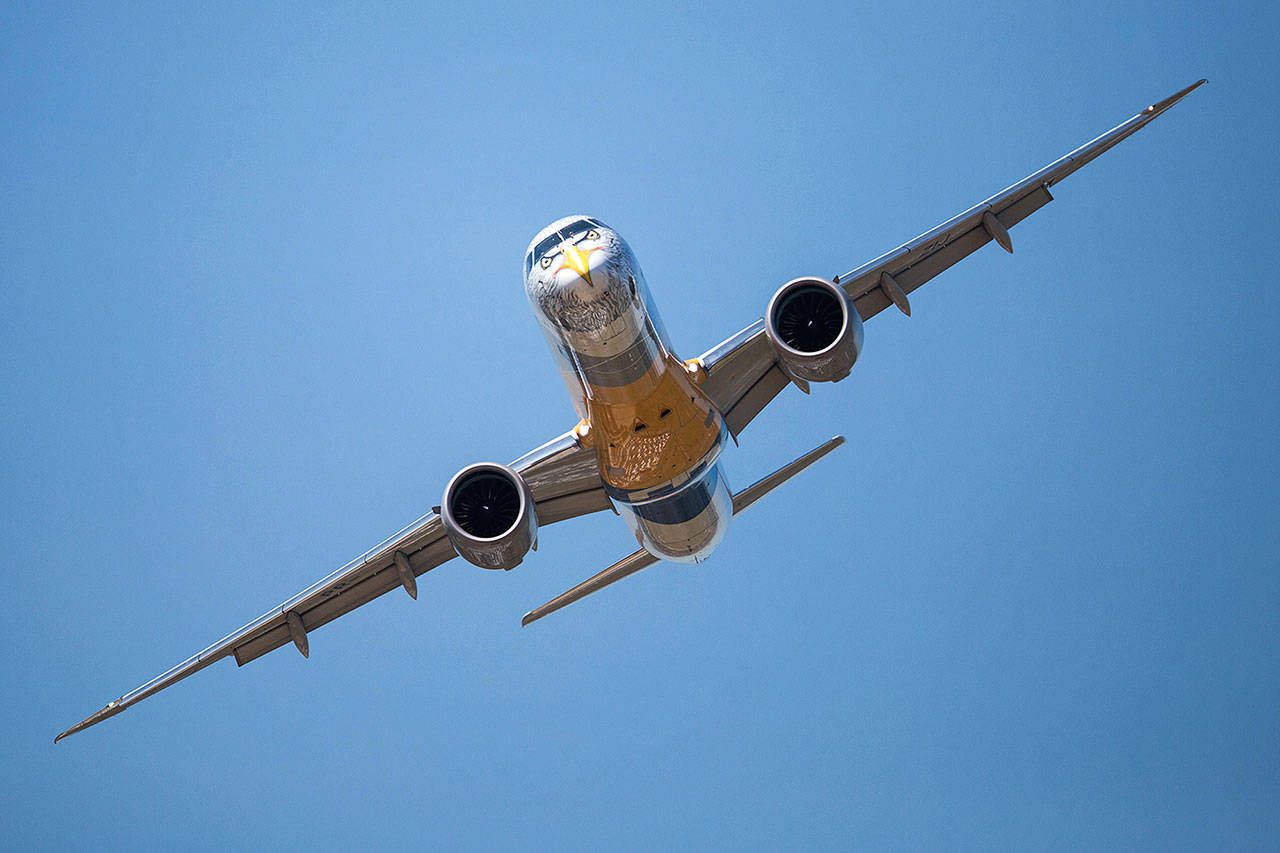By Julie Johnsson and Fabiola Moura / Bloomberg News
CHICAGO — The Boeing Co. is forming a $4.75 billion venture with long-time industrial partner Embraer, a move that will bolster its arsenal in a new battlefront with Airbus: the market for smaller jetliners.
Under a preliminary deal, Boeing will own 80 percent of a partnership controlling Embraer’s commercial airplane and services businesses while the Brazilian manufacturer will hold 20 percent, the companies said in a statement Thursday. The tie-up caps years of talks between the two, while extending the duopoly held by Boeing and Airbus as competitive threats emerge from rivals in Russia, Japan and China.
By adding Embraer’s EJet family to its portfolio, Boeing will expand its manufacturing base abroad while extending reach into the market for 100-seat planes. Airbus took control of Bombardier’s C Series jet on July 1, through a joint venture it forged with no out-of-pocket cost. Boeing was left without a comparable offering, while Embraer — Bombardier’s main rival — faced a tough new competitor in Airbus’s global marketing organization.
“The agreement with Boeing will create the most important strategic partnership in the aerospace industry, strengthening both companies’ leadership in the global market,” Paulo Cesar de Souza e Silva, Embraer’s chief executive officer, said in the statement.
Analysts had speculated that the Embraer commercial-airplane unit would fetch a higher price than the $3.8 billion valuation for Boeing’s stake in the venture.
“This important partnership clearly aligns with Boeing’s long-term strategy of investing in organic growth and returning value to shareholders, complemented by strategic arrangements that enhance and accelerate our growth plans,” CEO Dennis Muilenburg said in the statement.
Embraer, a jewel of Brazilian industry, will remain a separate company that makes military and private jets while reaping a revenue stream from the new partnership. The structure, along with the company’s flagging sales and an increasingly challenging market, helped win the support of the Brazilian government.
Boeing and Embraer said they plan to form a second joint venture to develop new markets for defense products and applications that bolster the Brazilian company’s military portfolio, including its KC390 cargo aircraft.
The commercial venture will be run by a Brazil-based CEO and management team, while Muilenburg will have ultimate control. The companies expect to finalize the agreement over the next several months and close the deal by the end of next year after securing regulatory approval. The partnership is expected to add to Boeing’s earnings beginning in 2020.
For years, Boeing and Airbus focused on larger, more-profitable jetliners and shifted away from the smaller planes, which have similar development costs but sell for lower prices. Airbus’s deal with Bombardier, and Boeing’s pact with Embraer, signal that the big planemakers intend to deny a foothold in the lucrative narrow-body market to ambitious newcomers, such as Commercial Aircraft Corp. of China.
Embraer brings engineering talent that Boeing could tap for the new midrange jet on its drawing board, dubbed the 797. Embraer also has lower-cost production capability that Chicago-based Boeing could use to build components such as actuators and landing gear as it brings more supplier work in-house, said Canaccord Genuity analyst Ken Herbert.
The Brazilian company has overtaken Bombardier as the largest manufacturer of regional jets while burnishing its reputation for engineering prowess. In an industry where product delays are the norm, Embraer has introduced 10 all-new aircraft over the past 15 years, largely on budget and on time, Ron Epstein, an analyst at Bank of America Corp., wrote earlier this year.
Sao Jose dos Campos, Brazil-based Embraer debuted the first of its E2 family of upgraded jets this year. The E190E2 competes directly with Bombardier’s smallest C Series, seating as many as 114 travelers and powered by the same Pratt & Whitney geared turbofans as the Canadian jet.
Created in 1969 by the Brazilian government and privatized in 1994, Embraer has been touted as a source of national pride for the commodities-driven country and an example of efficiency and innovation, though corruption scandals in the past few years have tainted that image.
With assistance by Brandon Kochkodin, and Vinicius Andrade.
Talk to us
> Give us your news tips.
> Send us a letter to the editor.
> More Herald contact information.

























